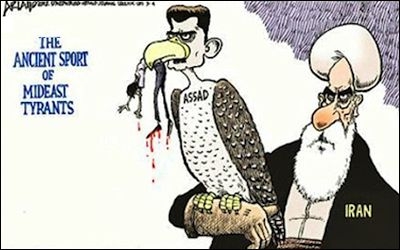Syrian army tears through the south to sweep Iran and Hizballah up to Israel’s Golan doorstep
DEBKAfile Exclusive Report February 11, 2015
The large-scale offensive the Syrian army launched in southern Syria Sunday, Feb. 8 – the broadest in that region in the nearly-four year conflict – heralded Act III of the Iranian-Hizballah drive for a position on Israel’s Golan border, debkafile’s military sources report. Israel curtailed Act I on Jan 18 with an air strike which killed a dozen Iranian and Hizballah officers scooping out the Golan town of Quneitra for their new base. Among them were the commander of Iranian forces in Syria, Revolutionary Guards general Mohamad Ali Allah Dadi and a senior Hizballah officer Ali al-Tabtabani.
This cut short a move to seize a forward position in the northern Golan and adjacent Hermon.
Prime Minister Binyamin Netanyahu and Defense Minister Moshe Ya’alon then reiterated that Israel would not permit Iran and Hizballah to create a military enclave there for their forces to jump-start terrorist strikes and rocket attacks against Israel.
Act II came ten days later with the Hizballah attack, aided by Iranian tactical intelligence, on an Israeli command patrol, in which killing Major Yochai Klingel and St. Sgt. Dror Nini were killed.
Although nothing happened for twelve days – some Hizballah sources even suggested the account was closed – all the parties were braced for the next round in the struggle playing out for the Golan.
On Jan. 30, Hizballah leader, Hassan Nasrallah stood up in Beirut for a furious speech to dictate terms: If Israel persisted in its refusal to live with an Iranian-Hizballah presence on the Golan, there would be war,he shouted.
On Feb. 2, the influential Iranian lawmaker Alaeddin Boroujerdi, chairman of the majlis foreign affairs and security committee, declared that the account with Israel over the Quneitra attack was still open and more “operations” were coming.
And they did on Feb. 8 from an unexpected direction – the south. Elements of the Syrian army’s Ninth Division and 121st Brigade armed with 50 T-72 tanks led a sweeping Iranian-Hizballah offensive dubbed “Operation Ali Allah Dadi for Quneitra Martyrs.”
With them were 4,000 Shiite fighters imported by Iran for the battle and several hundred Hizballah gunmen – all under the command of Iranian Revolutionary Guards officers.
The operation started out with an Iranian-led force advancing on the southern Syrian town of Deraa – part of which is held by Syrian rebels – and heading for the junction of the Syrian-Jordanian and Israeli borders.
Strong dust and sand storms over the region this week restricts visibility and kept Syrian fighter jets grounded. Nonetheless, the Syrian-Hizballah-Iranian force, by dint of its superior numbers and fire power, were able to drive Syrian rebels out of many of the sectors they held and push them back toward the Israeli border.
By Tuesday night, ground reconnaissance had sighted the advancing force reaching a line 5-6 km south and east of Quneitra and in position to capture the Syrian Golan town.
Monday, Feb. 9, Syrian Foreign Minister Walid Muallem emphasized that Israel’s efforts to create a buffer zone on the Golan, like the security enclave it maintained in South Lebanon, would not succeed.
The object of the Quneitra offensive is clearly to root out Syrian rebel forces, claimed to be backed by Israel, from the positions they hold facing the Israeli Golan.To replace them, a token Syrian contingent made up mostly of Shiite fighters trained by Iran’s Revolutionary Guards and an armed Hizballah force will move in.
Tehran, Damascus and Hizballah are intent on forcing Israel to swallow the presence of their forces on the threshold of central and southern Golan – after their bid to park opposite the northern sector and the adjacent Hermon mountains was pre-empted by the Israeli air strike on their advance guard.
This last challenge has so far gone without an Israeli response. Heavy weather conditions over the region offer Netanyahu and Ya’alon a few days’ space for determining their next move. But doing nothing will let Tehran come out of Act III as the winner and clinch the finale of the struggle for a forward position on Israel’s Golan doorstep.























